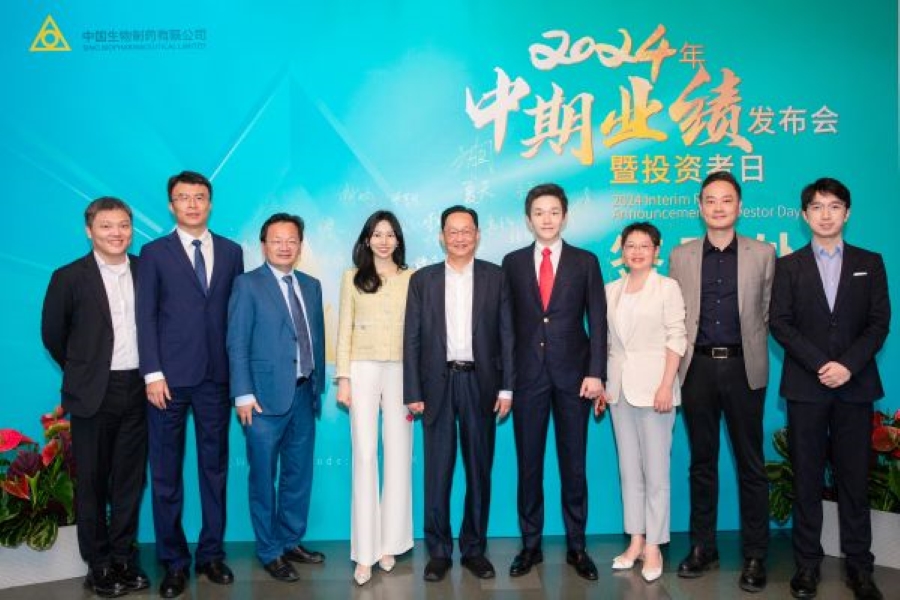Novel drugs lift Sino Biopharm earnings, easing price-cap pain

The pharmaceutical company posted an 11% rise in half-year revenue, helped by growing income from innovative medicines, as it pivots away from the generic drug business
Key Takeaways:
- Revenue from innovative and biosimilar drugs grew 14.8% in the first half of the year, with four products gaining marketing approval
- The company is speeding up its exit from the generics business while stepping up work on new drugs through in-house R&D and industry partnerships
By Molly Wen
China’s drugs industry is reinventing itself, aiming to come up with pioneering therapies rather than just emulate medicines already on the market.
The quest for ground-breaking products with global potential has become even more urgent as China’s medical procurement policies have capped domestic prices for many standard drugs.
Sino Biopharmaceutical Ltd. (1177.HK) is in the vanguard of the industry transformation. Once a colossus in generic drugs, the company now derives a growing share of its revenue from innovative and biosimilar medicines.
These products accounted for 38.6% of Sino Biopharm’s revenue in the first half of the year, up from 22.9% in the equivalent period of 2023.
The company said in its latest earnings report, released last month, that half-year revenue grew 11.1% to 15.87 billion yuan ($2.23 billion), when adjusted to exclude discontinued operations. Net profit surged nearly 140% to 3.02 billion yuan, as the bottom line was boosted by a 1.6 billion yuan gain from the sale of a stake in CP Pharmaceutical Qingdao, a subsidiary specializing in osteoporosis treatments and drugs with ingredients derived from marine organisms.
Without the one-off windfall, the company’s profit rose 14% to 1.54 billion yuan for the period, still outpacing the overall industry in a challenging operating environment. Investors welcomed the figures, driving the stock price up 11.5% over three sessions.
The company focuses its R&D efforts on four therapeutic areas: oncology, liver disease, respiratory conditions and products for surgery or pain relief. Generic drugs provide the business foundation while innovative products act as a growth driver. Novel and biosimilar drugs contributed 6.13 billion yuan in revenue in the first half of the year, 14.8% more than in the corresponding period last year.
A subsidiary that specializes in innovative drugs, Chia Tai Tianqing, had four products approved by Chinese drugs regulators in the period. In April its monoclonal antibody, benmelstobart, was cleared for use against small-cell lung cancer and a second oncology drug, unecritinib fumarate, was approved for advanced or metastatic non-small-cell lung cancer. In June another two products were approved, including a biosimilar form of liraglutide, a GLP-1 drug that helps regulate blood sugar.
The timing of those approvals meant sales did not flow into the first-half performance but they have the potential to benefit earnings going forward.
As for generic drugs, Sino Biopharm products with annual revenues exceeding 500 million yuan have all been folded into China’s centralized procurement program, resulting in hefty price markdowns and diminished operating revenue. For instance, the antiviral drug Runzhong has gone from star product to underperformer since being included in the pricing system. Launched in 2010, it was the first generic version of the hepatitis B drug Entecavir to be approved for use in China. The drug brought in annual sales of more than 3 billion yuan during the period from 2015 to 2017, before a price cut of up to 94% slashed its profits.
The company has not disclosed sales figures for the drug in recent years, but the performance of the broader category of liver drugs provides a clue. The segment’s revenue share fell from 45% in 2017 to 12.8% in the first half of 2024. Revenue from chemical generic drugs rose 9% in the first half to 9.74 billion yuan, with 11 generics approved by Chinese regulators during the period.
The company expects double-digit revenue growth this year, with sales of innovative drugs projected to reach 12 billion yuan. The forecast implies revenues will grow 10% in the second half, year on year, which Nomura Securities judged to be a feasible target given a low base last year. Many investment banks have given the stock a “buy” rating.
Investing in new drugs
Novel drugs have become a revenue engine for the company, but its pipelines still contain biosimilar and generic drugs that could face stiff competition once brought to market. Sino Biopharm is unusual in this respect, as most other innovative drug companies focus on a single product category.
For example, its monoclonal antibodies bevacizumab and rituximab, approved in 2023, are up against many similar products on the market. As a relative latecomer, Sino Biopharm will have to beef up marketing spending to get traction for its drugs. The company’s sales and distribution costs rose 11% in the first half to around 5.8 billion yuan.
Sino Biopharm has 76 innovative products and 65 generic products under development, according to its results statement. It spent 2.58 billion yuan on research and development in the half year, with 76% of the outlay going to innovative drugs and 24% to generics.
The company is in the process of shrinking its generic business while expanding its innovative range through its own R&D efforts or in partnership with industry peers. In April, it reached an agreement with the multinational drugs company Boehringer Ingelheim to jointly develop and commercialize its partner’s products in mainland China that have reached the clinical trial stage. Sino Biopharm told a global healthcare conference that industry collaboration would be a key growth driver going forward, and it revealed a goal of clinching five deals this year.
The company has targeted double-digit growth in both revenue and profit in 2025 and 2026, with innovative drug sales projected to account for 45% and 50% of annual turnover. Its current price-to-earnings (P/E) ratio is about 13 times, higher than the 10 times for CSPC Pharmaceutical Group (1093.HK), another company transitioning from generic to innovative drugs. The premium suggests investors see a brighter future for Sino Biopharm as the industry intensifies its focus on innovation in pursuit of bigger profits.
To subscribe to Bamboo Works free weekly newsletter, click here






